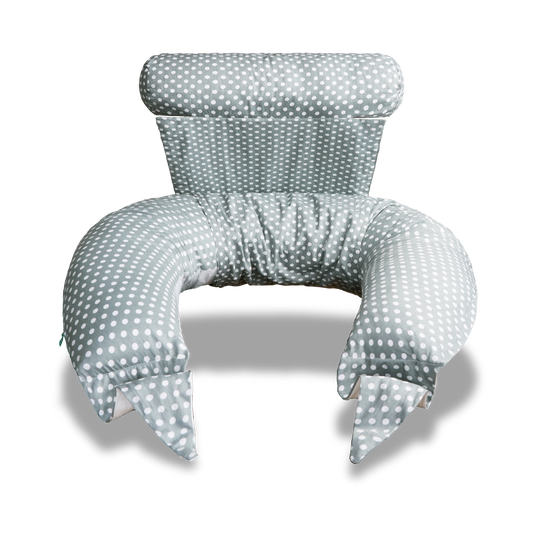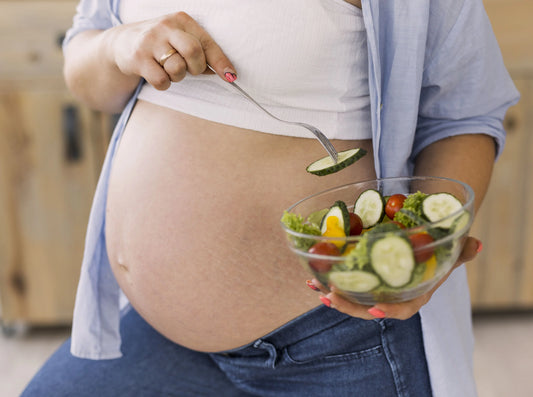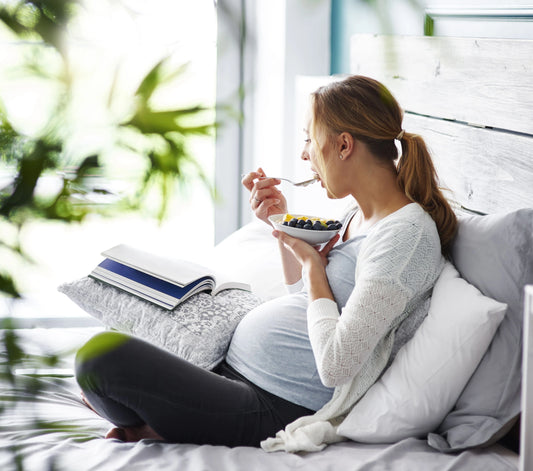When it comes to hunger and pregnancy, two types of mistakes are often made: using the excuse of "eating for two" to devour everything in sight and more, or fighting your hunger, at the cost of feeling famished, just so you don’t put extra weight on.
Both are actually of equal importance: doctors like to keep an eye on our diet as too much sugar is bad for us mums and babies.
This doesn’t mean that when you’re hungry you should just try and ignore it. The basic rule when you’re expecting a baby is to listen to your body. If your body is telling you it’s hungry, then you need to eat.
It’s more about the quality of what you eat rather than limiting the quantity.
How can you tame hunger during pregnancy and keep a healthy diet at the same time?
Eating well during pregnancy: foods to eat and foods to avoid
During pregnancy, making sure you eat well is more important than ever, for both the mum’s and the baby’s health.
The key is to have a balanced diet, consuming lots of fruit and vegetables, protein, carbohydrates, and healthy fats on a daily basis.
White meat is favoured over red meat, as it is lighter and easier to digest. Green light, however, for fish. Sugars should be limited, therefore don’t overdo it with desserts and sweet foods.
As you know, certain foods should be avoided altogether as they can cause toxoplasmosis and Salmonella infection: for example, raw eggs, raw fish and meat, mouldy cheeses.
Hunger and the notorious "cravings" during pregnancy
An increase in appetite is very common during pregnancy. Is it just plain hunger or is it the notorious cravings?
Many women report a change in taste whilst pregnant. Some develop a preference for sweet foods others for savoury. You develop a sudden hatred for foods you used to love.
There is also an emotive component tied to this change: inevitably all mums are apprehensive and nervous about the new phase they are entering. They worry about their baby’s health, work, the radical change on their everyday life.
This is probably where cravings come from: using comfort foods to calm our anxieties. That’s perhaps why the foods we tend to crave are sweet or carbohydrates, both of which instil a feeling of well-being.
How can you control hunger and cravings without being tempted by unhealthy food? We explain how in the next few paragraphs.
How to ease hunger during pregnancy: 5 helpful tips
The key to managing hunger successfully during pregnancy, is to understand what to eat rather than how much. Below you’ll find 5 useful tips on how to keep hunger in check and how to avoid being tempted by unhealthy foods.
1. Break meals up into 5-6 times per day
Eating more often throughout the day helps to keep you feeling fuller and prevent hunger. Ideally, break up your three main meals with a snack in-between, one mid-morning and one mid-afternoon.
The healthiest snacks are fruit, nuts, yogurt, cereals.
2. Eat light and wholesome foods
Generally speaking, it’s much better to eat lighter meals than heavier ones which contain excessive amounts of sugar and fat.
It’s vital to consume the right amount of protein, carbohydrate, and healthy fats, however, you may eat fruit and vegetables in larger quantities as they can help to keep you feeling full.
During pregnancy, it’s important to keep your evening meal light, especially in the last few months when digestion slows down, and you may be prone to heartburn. Sleeping may also prove more difficult after a heavy meal.
3. Drink at least two litres of water per day
Drinking at least two litres of water per day has a variety of benefits on our bodies: it helps maintain normal blood pressure, improves gut health, and regulates body temperature.
In our specific case, other than for general well-being, it’s also useful: it helps us feel fuller and leaves less space for hunger.
4. Have a good breakfast
Eating a good breakfast is a great starting point for feeling less hungry throughout the day. Make sure it’s balanced and filling to give you the right boost of energy you need: no to a coffee on-the-go, yes to milk, yogurt, toast, nuts, and cereals.
5. Fill your fridge with healthy foods
Satisfying your hunger with cakes and crisps is much harder if you don’t have any at home in the first place. The best solution is to get rid of all unhealthy foods, so you can’t be tempted!
Instead, fill the fridge with healthy foods, such as vegetables and fruit.
Feeling hungry constantly at night: what can you do?
Eating more often and not leaving too much time in-between meals will help keep hunger at bay.
The worst type of hunger is the kind you experience at night just before falling asleep. Night-time hunger is terrible, especially as you are tired, and this makes it even more difficult to control.
Certain foods can help you sleep well and stop you lying in bed wide awake starving.
These are foods that contain tryptophan, an amino acid which stimulates the production of serotonin, such as bananas, mangoes, legumes, dried fruit, bitter cocoa.
Another method which can help you sleep well despite your pregnancy bump and back pain is our Koala Hugs pillow, which helps you maintain the best position throughout the night and alleviates back pain.
Is it normal not to feel hungry during pregnancy?
You have the opposite problem: since you’ve been pregnant you’ve lost your appetite. This makes you slightly concerned as you know it’s not the best time to be eating less, your baby needs to grow.
Don’t worry, it happens quite frequently. Your body is undergoing significant physical changes. The HCG hormone, which is present in our blood only during pregnancy, is the culprit for our loss of appetite.
And we haven’t even spoken about the nausea, constipation, wind, heartburn yet; all of which often affect expectant mums.
There are certain foods that can help keep nausea at bay. Our advice is to eat little, light and often, so you don’t run out of energy.
The best pregnancy nutrition plan is simply very similar to that of a healthy diet, which we all should be following throughout the course of our life. Which of our 5 tips for managing pregnancy hunger seems most useful to you?
The information contained on this Site is purely of an informative nature and does not replace any diagnosis or treatment advice received from a doctor. We recommend that you always seek advice from your family doctor and / or specialists.








